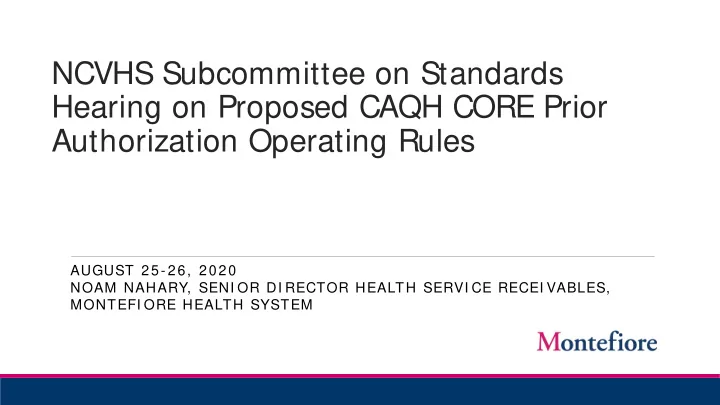

NCVHS Subcommittee on Standards Hearing on Proposed CAQH CORE Prior Authorization Operating Rules AUGUST 25- 26, 2020 NOAM NAHARY, SENI OR DI RECTOR HEALTH SERVI CE RECEI VABLES, MONTEFI ORE HEALTH SYSTEM
Montefiore Health System is one of New York’s premier academic health systems and is a recognized leader in providing exceptional quality and • Montefiore Health System has engaged with CAQH CORE personalized, accountable care to since inception and has benefited significantly from approximately three million people in operating rules. communities across the Bronx, Westchester, and the Hudson Valley. • Examples of how Montefiore has benefited from federally It is comprised of 10 hospitals, including the Children’s Hospital at mandated operating rules for eligibility, claim status, and Montefiore, Burke Rehabilitation payment and remittance transactions include: Hospital, and close to 200 outpatient care sites. The advanced clinical and • Decreased claim denials and accounts receivable translational research at its medical • Time saved in registration and billing school, Albert Einstein College of Medicine, directly informs patient • Increase in patient collections at the time of service care and improves outcomes. From • Reduced transaction fees and connectivity costs the Montefiore-Einstein Centers of Excellence in cancer, cardiology and • Increase in auto-adjudication of payment and remittances vascular care, pediatrics, and transplantation, to its preeminent • Montefiore’s proprietary systems are CORE-certified for school-based health program, Eligibility & Benefits and Claim Status. Montefiore is a fully integrated healthcare delivery system providing coordinated, comprehensive care to patients and their families. 2
Anticipated Value of Proposed Prior Authorization Operating Rules • Faster, Timelier Patient Care • Current health plan response times to initial prior authorization (PA) requests range from 1-14 days at Montefiore, resulting in care delays . The response time requirements will reduce procedure wait times, improve scheduling processes, create common expectations across health plans, and ensure timely delivery of essential patient care. • Greater Automation of Prior Authorization Workflows • Implementation of the proposed operating rules by all HIPAA-covered entities will enable Montefiore to transition away from web portals and manual prior authorizations and implement greater automation via the X12 278. With a higher volume of electronic transactions that include greater clarity on reasons for an authorization decision and additional documentation needs, Montefiore can create efficiencies in its workflows and simplify processes. • Reduced Costs/Resources to Support Prior Authorization • Montefiore Health System employs ~175 staff ($11M in annual FTE costs) to manage PAs via web portals, phone, and faxes. Staff spend significant time on data entry into web portals, phone calls, and fax machines to support initiation, submission, and confirmation of each authorization. With a federal mandate of the proposed rules, Montefiore estimates a $6M annual reduction in FTE costs plus additional savings due to reductions in denial and appeal efforts. 3
Anticipated Concerns About Proposed Prior Authorization Operating Rules • Limited Adoption without a Federal Mandate • It is evident, given the current state of PA, that more than just goodwill is necessary to drive efficiencies and automation. A federal mandate will accelerate industry adoption beyond early implementers by making investment dollars and resources available to ensure compliance. CORE Certification data suggests that federal mandates drive adoption and certification, enabling prioritization and vendor development. • Need for a Federal Attachments Standard • Industry has waited many years for a HIPAA-mandated attachment standard to automate the exchange of additional documentation for claims and PA. While federal adoption of the proposed CAQH CORE Operating Rules will lead to greater industry-wide PA automation, efficiencies, and cost savings, the lack of a common standard for documentation exchange may prevent fully electronic business processes. • Exclusion of Acknowledgement Requirements • With previously mandated operating rules, the Department of Health and Human Services (HHS) excluded requirements pertaining to acknowledgements. An electronic acknowledgement provides immediate assurance that a transaction is accepted by the receiver. Excluding these requirements for PA will result in costly, manual phone call and fax follow-up with health plans to determine transaction status. 4
Key Considerations for NCVHS Related to Proposed Prior Authorization Operating Rules Adoption of the proposed CAQH CORE Prior Authorization and Connectivity Operating Rules will drive greater automation, increase efficiencies, improve access to timely patient care, enhance health plan and provider data exchange, and significantly reduce industry spend on prior authorization processes. Without a federal mandate, implementation of the operating rules will lag, resulting in continued inefficiencies and delays, and ultimately, poorer patient outcomes. Patient experience is a cornerstone of the care model employed at Montefiore. Delays and inefficiencies in the current prior authorization process have a direct, negative impact on patient care. The industry must address this challenge now. The proposed operating rules enable greater automation, reducing and eliminating unnecessary delays and inefficiencies. 5
Recommend
More recommend